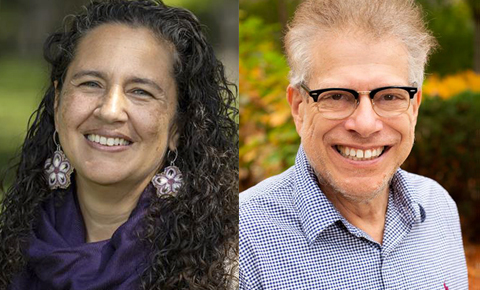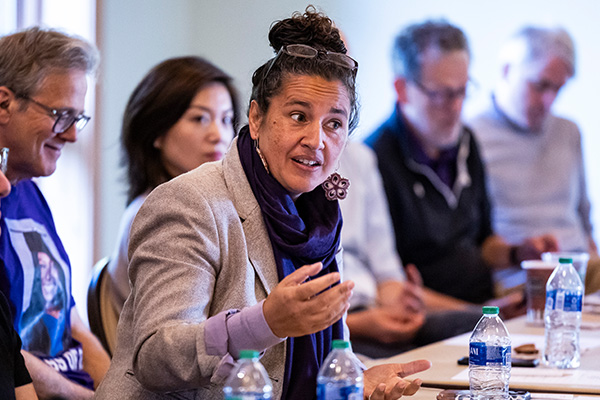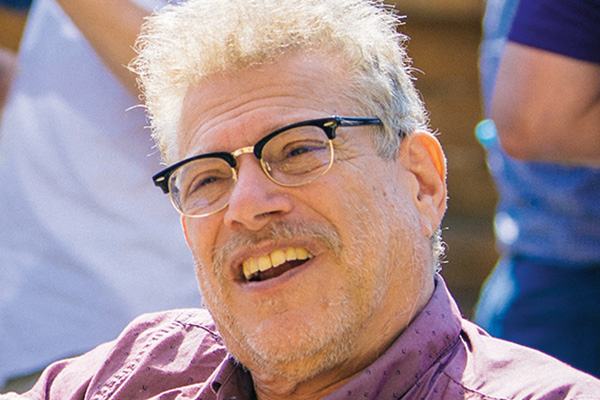Faculty Elected to American Academy of Arts and Sciences

Northwestern University School of Education and Social Policy faculty members Megan Bang and Uri Wilensky were elected to the American Academy of Arts and Sciences, one of the nation’s oldest and most prestigious honorary societies.
In addition to Bang and Wilensky, Northwestern’s Bruce Carruthers, Wei Chen, Mark G. Hersam, and Suzan van der Lee are among this year’s class of 250 artists, scholars, scientists, and leaders in the public, nonprofit and private sectors.
The Class of 2024 represents 31 areas of expertise and includes everyone from Apple CEO Tim Cook, actor George Clooney, and violinist Vijay Gupta to author Jhumpa Lahiri and cancer researcher David A. Tuveson.
The School of Education and Social Policy now has seven members in the Academy. Bang and Wilensky join Larry Hedges, Board of Trustees Professor of Statistics; Kirabo Jackson, Abraham Harris Professor of Education and Social Policy; Carol Lee, professor emeritus of learning sciences and education; Doug Medin professor emeritus of education and psychology and James Spillane, the Spencer T. and Ann W. Olin Professor in Learning and Organizational Change.
School of Education and Social Policy Dean Bryan McKinley Jones Brayboy called Bang and Wilensky “remarkable scholars and prominent learning scientists who force us to imagine new ways to thinking about the intersections between learning and cognitive science, the role of technology in advancing solutions for pressing problems, and considering the ways that place facilitates learning across generations.
“I am thrilled for them,” he added. “This is a well-deserved honor and recognition.”
In the Education division, only Northwestern’s School of Education and Social Policy and Harvard's Graduate School of Education had two people elected to the Academy this year.
Learn more about our outstanding faculty members:
Megan Bang:
 Bang, professor of learning sciences, has spent much of her career studying what teaching and learning could–and should–look like in a world with a changing climate and human cognition as it relates to sustainability.
Bang, professor of learning sciences, has spent much of her career studying what teaching and learning could–and should–look like in a world with a changing climate and human cognition as it relates to sustainability.
A member of the National Academy of Education and its Board of Advisors, she is the director of Northwestern’s Center for Native American and Indigenous Research. In 2024 she was named a 2024 fellow of the American Educational Research Association.
One of Bang's most ambitious projects is a National Science Foundation-funded research initiative called Learning in Places, a model of pedagogy that centers racial equity, ethical, evidence-based decision-making, and just relations with the natural world. As a routine part of their school day, children are immersed in outdoor based learning in science and literacy as well as in civics and social studies. The model “bakes in” equitable approaches to education as well as socio-emotional dimensions of learning and wellbeing, Bang said.
The initiative directly builds on Bang’s decades of research with Indigenous communities, a program called Indigenous STEAM, that developed Indigenous models of education based in and with lands and water.
Bang, who serves on the Board of Science Education at the National Academy of Sciences, is the principal investigator of the effort, which prepares students to wrestle with and engage in creating change around issues of socio-ecological justice such as food sustainability and water use.
After graduating from Williams College in Massachusetts, Bang earned her PhD in learning sciences at SESP in 2009 while also working at the American Indian Center of Chicago.
“I’m deeply interested in how education, instead of being a source of trauma, had the potential to heal Native communities—and all communities, really,” she said. “For me, this is always tied to relations with land and water, and I believe the 21st century is the time when all human communities need to learn sustainable and just ways of living.”
Uri Wilensky
 Wilensky, the Lorraine H. Morton professor of Learning Sciences and Computer Science is the founding director of the Center for Connected Learning and Computer-Based Modeling. One of the world’s leading visionaries, he is also the founding co-director of the Computer Science/Learning Sciences PhD program and co-founder of the Northwestern Institute on Complex Systems.
Wilensky, the Lorraine H. Morton professor of Learning Sciences and Computer Science is the founding director of the Center for Connected Learning and Computer-Based Modeling. One of the world’s leading visionaries, he is also the founding co-director of the Computer Science/Learning Sciences PhD program and co-founder of the Northwestern Institute on Complex Systems.
After completing his PhD at the Massachusetts Institute of Technology, Wilensky turned his attention to the problem of preparing students to deal with the increasing complexity of our world through computer modeling. He ultimately created a computer language and environment called NetLogo to represent complex systems, visualize them and analyze them.
His award-winning NetLogo modeling environment, the most widely used in the world, has helped hundreds of thousands of students, teachers, and researchers tackle complex ideas ranging from the formation of crystals and galaxies, the behavior of insect swarms, to the patterns of wealth distribution, inequality, and segregation in a city.
Computational representations—or the depiction of knowledge as computer code— help illustrate how complexity emerges when elements in a system interact, which in turn “reveals more of what’s actually going on,” Wilensky explains. To keep our ecology in balance, for example, we need to see how global transportation networks can allow an invasive plant or animal to arrive in a foreign ecosystem, invade it, and dominate it.”
Known as the father of a worldwide movement to harness the power of computer modeling and simulations and foster the mindset known as “computational thinking,” he was an early advocate of integrating computation into all school subjects and has authored numerous computational science curricula.
Wilensky, who came to Northwestern in 2000, has long argued and demonstrated that when younger students learn conceptual STEM content through a computational modeling approach, they can grasp the material as well as college students do.
His research also suggests that it’s easier to train teachers in computational thinking in their subject areas, such as chemistry or history, than to train and retain full-time computer science teachers, who are in short supply. This strategy of including many subject areas ensures that more students, including traditionally underrepresented groups, will have opportunities to learn computational thinking.
The Academy was founded in 1780 by John Adams, James Bowdoin and others who believed the new republic should honor exceptionally accomplished individuals and engage them in advancing the public good. The Academy’s dual mission remains essentially the same 240 years later with honorees from increasingly diverse fields and with the work now focused on the arts and humanities, democracy and justice, education, global affairs, and science.
The full list of the AAAS class of 2024 from the education section:
- Megan Bang, Northwestern University
- Prudence Carter, Brown University
- David Gillborn (IHM), University of Birmingham
- Heather C. Hill, Harvard Graduate School of Education
- Tyrone C. Howard, University of California, Los Angeles
- Bridget Terry Long, Harvard Graduate School of Education; National Bureau of Economic Research
- Ernest Morrell, University of Notre Dame
- Sonia Nieto, University of Massachusetts Amherst
- José Weinstein Cayuela (IHM), Universidad Diego Portales
- Uri Joseph Wilensky, Northwestern University